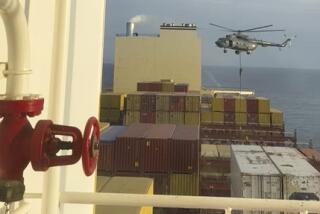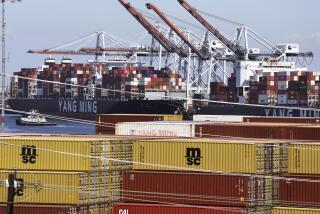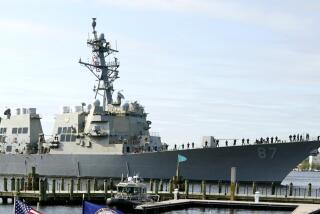Ports in Lower Gulf Say Ships Face No War Risk
- Share via
DUBAI, United Arab Emirates — Its confidence bolstered by Western warships in the Persian Gulf, Dubai’s busiest port is trying to convince London underwriters that war-risk insurance is no longer necessary in the lower end of the waterway.
“We’re suggesting they rezone the gulf into a realistic pattern,” Dick Denning, marketing manager for Port Rashid, said Saturday. “We’d like to get some of those fellows out here to see how calm it is.”
When Iraqi troops invaded Kuwait, the London underwriters, who handle the majority of the world’s marine insurance, drew a line across the Strait of Hormuz and demanded war-risk riders for any ship going farther up the gulf. For a typical $50-million container ship, that meant $100,000 in extra premiums for insurance on the ship itself and higher premiums on cargoes as well.
The Port Rashid Authority is proposing that the line be moved about 110 sea miles farther west to a point just beyond Abu Dhabi, which would place the ports of the United Arab Emirates in a risk-free zone.
Denning said that the Emirates’ ports have been getting bad press, and that there is no reason the shipping situation in the lower gulf should not be business as usual.
“I think the underwriters are making their judgments based in part on the British press,” he said at his port authority offices. “That’s why we want to get them out here for a firsthand look.”
The Emirates’ ports have clearly been affected by the confrontation in the gulf, however. On the dock at Port Rashid, for instance, 1,800 cargo containers ticketed for Kuwait sit undelivered, caught in a legal morass. They were aboard ships at sea when the Iraqis invaded and got no farther than Dubai. Other ships bearing Kuwait- or Iraq-bound cargoes were turned away, particularly those carrying cargoes such as steel and timber.
Many cargoes had been sent CIF (cost, insurance and freight), which is the shipping equivalent of cash on delivery. With Kuwaiti importers hamstrung by frozen assets and other problems, a legal thicket has arisen over rights and payments on the cargoes. “It will be a real jungle to sort out who owns this stuff now,” one gulf port official said recently.
Kuwaiti business people who were overseas when their country was occupied are attempting to claim their consignments, but they don’t have the paperwork. “All of their documents are in Kuwait,” said Abdul Rahman Mutaiwee, head of the Dubai Chamber of Commerce.
Denning rebutted reports that millions of dollars worth of meat and chocolate were rotting in refrigerated containers--”reefers”--on Emirate docks. “We have some Kuwaiti-bound reefers here,” he said, but he showed a reporter how they were connected to electrical power and kept refrigerated.
Furthermore, he said, 300 Kuwaiti containers have already been cleared from the docks, their cargoes presumably being reconsigned to Emirate importers for local distribution. “If the shipping line and an importer tell us they have an agreement, we move them out,” he said. The remaining 1,800 represent a small fraction of the 30,000 containers now at Port Rashid, waiting for transshipment into the lower gulf markets.
Port Rashid and Dubai’s other big port, Jebel Ai, have been aggressively promoted in recent years and have made the sheikdom a key center for trade in the Middle East and beyond. Cargoes of containers, automobiles and general freight deposited in the tax-free ports are reshipped to ports in the Far East, India, East Africa and elsewhere in the Middle East.
More to Read
Sign up for Essential California
The most important California stories and recommendations in your inbox every morning.
You may occasionally receive promotional content from the Los Angeles Times.













